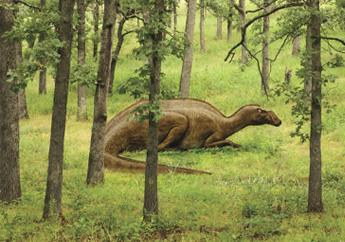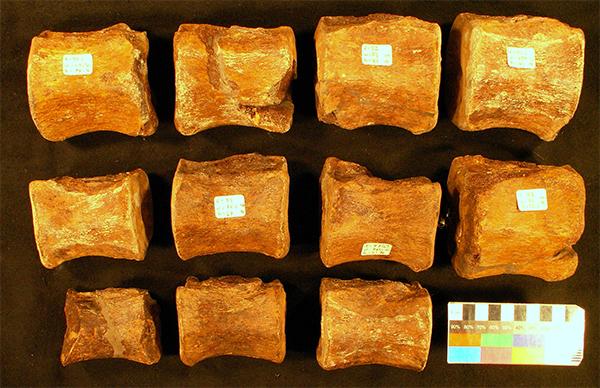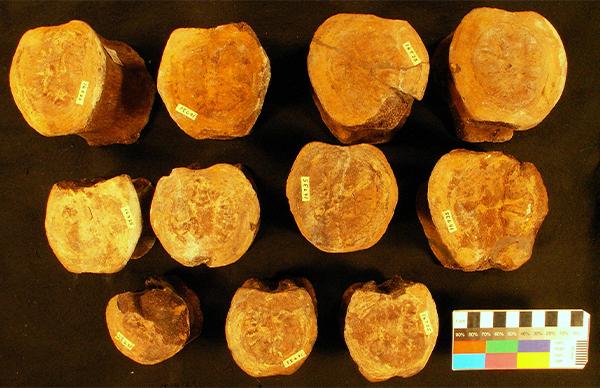Missouri Geological Survey Director: Carey Bridges, RG
First Dinosaur Bones Discovered in Missouri
In 1942, Daniel R. Stewart, a geologist with the department’s Missouri Geological Survey and graduate of Missouri School of Mines and

Metallurgy (now Missouri University of Science and Technology), both in Rolla, was researching clay deposits in Bollinger County near the town of Glen Allen, approximately 35 miles west of Cape Girardeau. While examining an outcrop of clay in a creek bank, a young boy named Ole Chronister poked his head over the top of the bank and asked what Stewart was doing.

When Chronister learned Stewart was researching clay in the area, he told Stewart there was clay on his family’s property and he invited Stewart to investigate. On-site, Stewart observed several neatly stacked bones the family had found while digging a well they later abandoned because sufficient water was not found. Stewart recognized them as being dinosaur bones, and he found more bones 9 feet below the surface. The were embedded in clay inside the well (where the other bones were found), marking the first known discovery of dinosaur remains in Missouri.
Mrs. Chronister gave the bones to Stewart so they could be examined by paleontologists. The vertebrae bones eventually were identified as belonging to a hadrosaur – a plant-eating duck-billed dinosaur having more than 1,000 teeth. Mrs. Chronister sold most of the bones to the U.S. National Museum, which later became the Smithsonian Institution. Named Hypsibema missouriensis, it became Missouri’s official state dinosaur in 2004, two years before Stewart’s death. In 2022, the State Legislature renamed it Parrosaurus missouriensis.
In 2016, members of the Stewart and Chronister families were honored by the department and the Bollinger County Museum of Natural History during a ceremony held at the Bollinger County Museum of Natural History.
See reproductions of the state dinosaur’s bones and a small model of the dinosaur at the department’s Ed Clark Museum of Missouri Geology.
On Nov. 22, 2021, Sainte Genevieve Museum Learning Center curator Guy Darrough formally announced the discovery of an adult Parrosaurus missouriensis fossil at the Chronister site. Darrough, director of the dig site, said the fossil and its surrounding material weighed 2,500 pounds. The dinosaur was excavated by a team including Dr. Pete Makovicky of the University of Minnesota and Akiko Shinya of the Field Museum. The specimen was transported to the Field Museum in Chicago where it will be cleaned, studied and eventually displayed. Visit the Learning Center where you can see a large model of the dinosaur and others, and visit their lab where you can view scientific studies being conducted on dinosaur bones and real fossils.


Nothing in this document may be used to implement any enforcement action or levy any penalty unless promulgated by rule under chapter 536 or authorized by statute.
For more information
Geological Survey Program
Missouri Geological Survey
P.O. Box 250
Rolla, MO 65402-0250
United States
